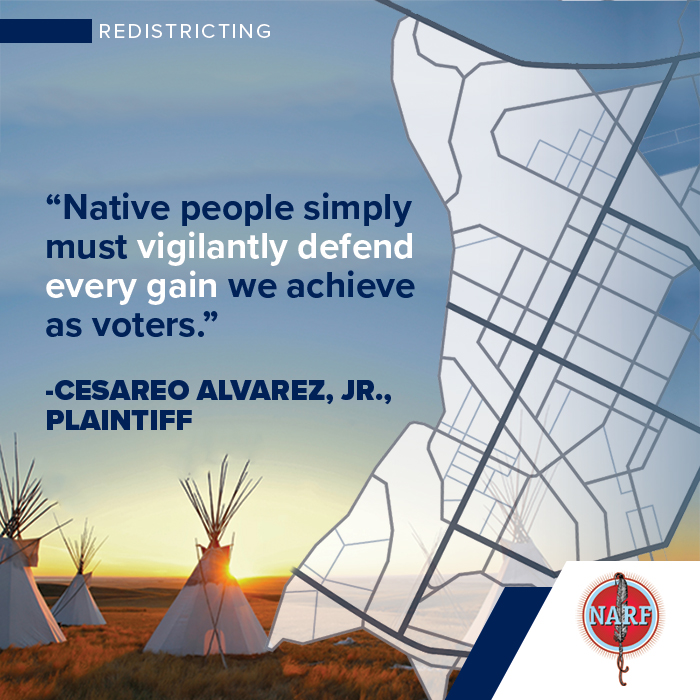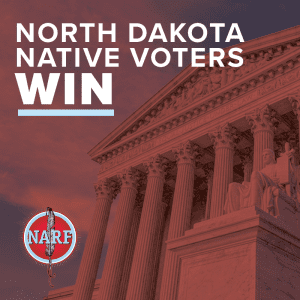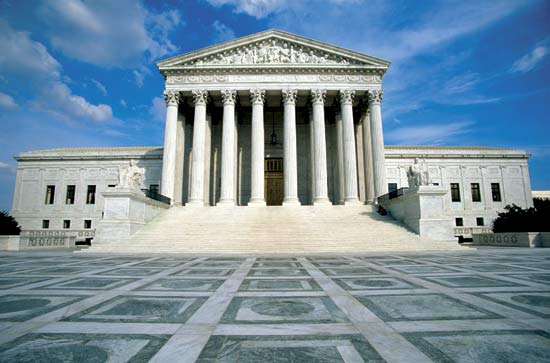The Walen v. Burgum lawsuit sought to eliminate the majority-Native-voter state legislative subdistrict that encompasses the Fort Berthold Reservation in North Dakota. Individual voters and the Mandan, Hidatsa and Arikara (MHA) Nation, along with the state of North Dakota, successfully defended the creation of House District 4A, a district that gave MHA voters an opportunity to elect their candidate of choice. When the plaintiffs appealed the decision to the U.S. Supreme Court, surprisingly, the North Dakota Attorney General asked the Court to throw out the legal victory that upheld the subdistrict. In a win for Native voting rights, on January 13, 2025, the U.S. Supreme Court affirmed the lower court’s decision and preserved District 4A.
Background:

Although the state’s redistricting committee refused to hold public hearings on reservations in North Dakota, Mandan, Hidatsa and Arikara Nation (MHA) leadership and members took every available opportunity to advocate for the creation of a subdistrict. “The Mandan, Hidatsa and Arikara Nation requested the state legislature create a new subdistrict in the 2021 North Dakota redistricting process to allow voters who live on the Fort Berthold reservation to have fair elections, as required by the Voting Rights Act,” said MHA Chairman Mark N. Fox.
Tribal citizens advocated for a subdistrict that would encompass the Fort Berthold reservation, preserve the MHA Nation as a community of interest, and contain a majority Native voting age population, as required by the Voting Rights Act. The state legislature approved a map that included House District 4A, which complies with these requirements. The new subdistrict ensured reservation voters would have an equal opportunity to elect a candidate that represents their interests to the North Dakota State House.
In February 2022, two Republican officials filed suit in Walen et al. v. Burgum et al., seeking to dissolve the newly created majority Native-voter subdistrict. The MHA tribal government and individual reservation voters seek to join the lawsuit to defend the interest of subdistrict voters. “We seek to join the lawsuit and defend the creation of the MHA subdistrict, because fair districts benefit everyone and Native American voters deserve a voice,” said Chairman Fox.
Voter Cesar Alvarez, who is a citizen of the MHA Nation and lives on the Fort Berthold reservation, also sought to join the lawsuit as an intervenor. “As a North Dakota voter, I want to join this lawsuit and defend my right to help shape North Dakota’s future. Taking away the newly created house subdistrict would allow surrounding areas to consistently out-vote reservation voters no matter how many of us voted—and that’s not how a fair democracy works,” said Alvarez.
The Litigation:
March 2022: Complaint Filed
On March 30, 2022, the Mandan, Hidatsa and Arikara Nation (MHA) and individual Native American voters filed a motion with the United States District Court for the District of North Dakota to intervene in Walen et al. v. Burgum et al. “The state demonstrated how little it cares for input from reservation voters by refusing to hold public hearings on reservations during the redistricting process. I am requesting to defend the creation of House District 4A because I cannot sit by and let a politically motivated lawsuit dilute my vote,” said voter and proposed intervenor Lisa DeVille of Mandaree, North Dakota, who is a citizen of the MHA Nation.
The Native American Rights Fund (NARF), Campaign Legal Center (CLC), and the Law Office of Bryan L. Sells, LLC, represent the parties. “Tribal governments, reservation residents, and Native voters have faced challenge after challenge in gaining participation and equity in the redistricting process. In joining this lawsuit, the Mandan, Hidatsa and Arikara Nation and individual Native voters would have the chance to ensure the court understands the impact that dissolving the subdistrict would have on Native voting rights for the next decade,” said NARF Staff Attorney Michael Carter.
April 2022: Motion to Intervene Granted
On April 5, 2022, the Motion to Intervene was granted. Now the MHA Nation and Native voters will have the opportunity to represent their interests in court in a case that seeks to take away their Native-majority subdistrict.
November 2023: U.S. District of North Dakota Court Rules We Agree with the MHA Nation and the State
Native American voters and the Mandan, Hidatsa and Arikara Nation (MHA) alongside the state of North Dakota, successfully defended the creation of House District 4A, a subdistrict that follows the boundaries of MHA’s Fort Berthold Reservation. On November 2, 2023, a panel of judges in the U.S. District Court for the District of North Dakota ruled in favor of the tribal intervenors, granting summary judgment and finding compelling and unrefuted evidence that the new subdistrict is required under Section 2 of the Voting Rights Act (VRA).
“This decision ensures that our representation at the state level is not diminished,” said MHA Chairman Mark N. Fox. “The Mandan, Hidatsa and Arikara Nation joined this lawsuit to support the Native voters who finally gained a voice in the North Dakota legislature because of House District 4A. For the first time in a long time, MHA voters were able to elect a candidate of their choice last year.”
“This decision will positively impact North Dakota and the lives of everyone who lives on the reservation for years. Representation matters and I will continue to work hard to have their voices heard and their issues addressed,” said plaintiff Representative Lisa DeVille of Mandaree, North Dakota, who is an MHA citizen and who was elected as the state House Representative for the new subdistrict 4A in the last election.

Plaintiffs and local Republican party officials Charles Walen and Paul Henderson filed the lawsuit, claiming that the state had engaged in racial gerrymandering, which the court firmly rejected. The decision noted that the state created the subdistrict to prevent Native vote dilution and that “… without the subdistrict, Native American voters would in fact have a viable Section 2 voter dilution claim under the VRA. Taking that unopposed evidence as true, granting Walen and Henderson the relief they seek as to district 4—eliminating the subdistrict—would be itself a violation of the VRA and federal law.”
“Protecting the new MHA subdistrict was important because we have fought so hard to be able to exercise our right to vote in North Dakota. Native people simply must vigilantly defend every gain we achieve as voters,” said plaintiff Cesareo Alvarez, Jr.
The Native American Rights Fund (NARF), Campaign Legal Center (CLC), and The Law Office of Bryan L. Sells, LLC, represented the individual voters and MHA Nation who intervened in the lawsuit brought against the state by Walen and Henderson in 2022.
“The Mandan, Hidatsa, and Arikara Nation have a right to representation at the state level. This order shows that claiming racial discrimination that results in stripping voting power from Native Americans will not be tolerated. Native voters in this part of North Dakota finally have a voice in the state legislature, which has been a very long time coming,” said NARF Staff Attorney Michael Carter.
May 2024: Supreme Court Appeal
On May 6, 2024, voters and the MHA Nation urged the U.S. Supreme Court to dismiss the lawsuit or to uphold the U.S. District Court’s ruling that found in favor the Tribal Nation and the state of North Dakota. The lower court’s ruling found that North Dakota’s 4A subdistrict, which primarily followed the boundaries of the Fort Berthold reservation, was legal and required by the Voting Rights Act
On the same day that the Tribe was defending the win, the North Dakota Attorney General urged the Court to vacate the favorable ruling he had won and remand Walen v. Burgum back to the U.S. District Court for further review. The state’s filing stated: ‘This Court should vacate the District Court’s decision and remand for further proceedings.’
The abrupt change left the MHA Nation and individual voters on their own to defend North Dakota’s legislative actions and Native voters’ rights before the Supreme Court. “We opposed this unconscionable change of position,” said MHA Nation Chairman Mark N. Fox.
NARF Staff Attorney Michael Carter said: “North Dakota subdistrict 4A meets court-established redistricting criteria that require legislators to create a subdistrict to ensure that all votes count. The subdistrict follows the political boundaries of the MHA Nation and allows voters from the Fort Berthold Reservation an opportunity to elect a candidate of their choice to the North Dakota legislature. Native voters have struggled for generations to exercise their right to vote in North Dakota and gain representation at the state level.”
December 2024: Solicitor General
On December 10, 2024, at the request of the U.S. Supreme Court, the U.S. Solicitor General submitted an opinion in this appeal. According to that opinion, appellants lack standing to challenge Subdistrict 9A and the lower court was correct in holding that Section 2 required that subdistrict. From the brief:
“Appellants renew their contention that the North Dakota Legislative Assembly engaged in unconstitutional racial gerrymandering in drawing Subdistricts 4A and 9A. But appellants lack Article III standing to assert a racial-gerrymandering challenge to Subdistrict 9A because they never lived in that subdistrict and have not shown that they personally were subjected to any racial classification. The Court should thus dismiss the appeal as to Subdistrict 9A for lack of jurisdiction.
As to Subdistrict 4A, the district court correctly held that the Legislative Assembly had a strong basis in evidence to conclude that Section 2 required that subdistrict. Indeed, the district court concluded, based on undisputed evidence, that Section 2 actually did require the State to create Subdistrict 4A—a conclusion that appellants do not contest. The district court thus correctly rejected appellants’ challenge to Subdistrict 4A, and its factbound application of established legal principles to this unusual case does not warrant plenary review. Instead, the Court should summarily affirm the judgment below as to Subdistrict 4A.”
December 2024: Defending protections from gerrymandering
On December 26, 2024, Walen intervenors the MHA Nation and Native voters Cesar Alvarez and Lisa Deville, submitted an amicus brief to defend Section 2 of the Voting Rights Act in the U.S. Supreme Court review of Louisiana v. Callais (consolidated with Robinson v. Callais), a challenge to a fair district map that the Louisiana legislature enacted after Black Louisianans proved that the previous state redistricting map illegally diluted Black votes. The Native voters and MHA Nation filed an amicus brief to defend federal laws that protect voters from gerrymandering and allow the U.S. to conduct fair democratic elections.
“Like the Black voters advocating for a fair election map in Louisiana, Native voters in North Dakota have also had to file lawsuit after lawsuit to vindicate their right to vote. For many Americans, this unending civil rights struggle requires fighting in the courts for legal redistricting maps that allow their votes to count,” said Native American Rights Fund Staff Attorney Lenny Powell.
In their Callais amicus brief, the Tribal Nation and Native voters explained why the Court should reverse the Callais district court’s decision concluding that Louisiana’s current congressional map is an unconstitutional racial gerrymander. The brief pointed out that the U.S. Supreme Court already rejected similar claims by elected officials in Allen v. Milligan in 2023. The MHA and Native voter’s brief also rebuffed mischaracterizations in another amicus brief filed in the Louisiana case by 12 states that attempted to radically rewrite both the Native voter’s legal victory in Walen v. Burgum and the very meaning of Section 2 of the Voting Rights Act.
Read More: Callais amicus brief
January 2025: North Dakota Native Voting Rights Upheld by the Supreme Court

On January 13, 2025, the U.S. Supreme Court decided the Walen v. Burgum redistricting lawsuit and affirmed the U.S. District Court for the District of North Dakota decision that preserves North Dakota House District 4A, a subdistrict that gives Mandan, Hidatsa, and Arikara Nation reservation voters a long-awaited opportunity to elect state representation.
The lower court determined that state legislators were endeavoring to comply with Section 2 of the Voting Rights Act and redistricting best practices by creating an election subdistrict along the boundaries of the MHA reservation as part of 2021 redistricting.
“The MHA Nation is pleased that the Supreme Court has upheld North Dakota’s voter redistricting legislation. The legislation gives the MHA Nation a voice in the state legislature by redrawing fair districting voting lines. This win strengthens the civil rights of every citizen in the state and allows rural and reservation voters an equal opportunity to elect the person they want to represent their community in the state legislature,” said MHA Nation Chairman Mark N. Fox.
While the Indigenous intervenors in the case sided with the state to defend the North Dakota Legislative Assembly’s voting subdistrict 4A, North Dakota abandoned its own win during the appeal to the Supreme Court, failing to advocate for the state legislature’s voting map and citizens’ rights. The Supreme Court’s ruling serves to reject anti-voter sentiments in the state’s legal arguments that would detrimentally impact all voters.

The Native American Rights Fund, Campaign Legal Center, and the Law Office of Bryan L. Sells, LLC, represented the Indigenous parties in the defense of House District 4A. Native voters and Tribal leaders may find Census, redistricting, and voting rights resources at vote.narf.org.
More Cases

